|
|
|
Sort Order |
|
|
|
Items / Page
|
|
|
|
|
|
|
| Srl | Item |
| 1 |
|
| 2 |
ID:
097930
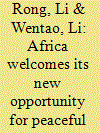

|
|
|
| 3 |
ID:
145124
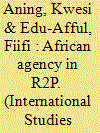

|
|
|
|
|
| Summary/Abstract |
Both the African Union (AU) and the Economic Community of West African States (ECOWAS) have been global leaders in embracing and operationalizing responsibility to protect (R2P). The adoption of the AU’s Constitutive Act, Article 4 (h) in 2000, has transformed its old-fashioned principle of noninterference to one of nonindifference. This authorizes the AU to intervene in Member States with respect to war crimes, genocide, ethnic cleansing, and crimes against humanity. ECOWAS has through its conflict prevention, management, and resolution protocol and its conflict prevention framework deepened and practicalized the notion of sovereignty as responsibility. These frameworks from both the AU and the ECOWAS have close similarities to the R2P norms. However, although these notions are captured in official documents, their actual operationalization faces challenges relating to sovereignty, limited institutional capacity, a restricted appetite for enforcement action, and a lack of explicit instruments to activate their intervention clauses in R2P-like situations. In spite of these challenges, the article argues that the initiatives of both the AU and the ECOWAS in Mali, Cote d’Ivoire, and Libya demonstrated a positively active African agency in contributing to global peace processes. This article, therefore, assesses the successes and limitations of African regional agency in enforcing R2P-like norms among its member states and its implications for and contributions to global international relations discourses.
|
|
|
|
|
|
|
|
|
|
|
|
|
|
|
|
| 4 |
ID:
131096
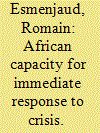

|
|
|
|
|
| Publication |
2014.
|
| Summary/Abstract |
The creation of an African Capacity for Immediate Response to Crisis (ACIRC) is a sign of Africa's willingness to take its destiny into its own hands. Presented as a reaction to the slowness of the development of the African Standby Force (ASF), it is also a response to some of the ASF's conceptual weaknesses. This decision reflects a wish to establish an instrument better equipped to deal with the challenges Africa is facing. Departing from the (sub)regional logic of the ASF results from a desire to take into account the transnational nature of threats, while its enlarged mandate is meant to offer Africa the capacity to intervene in all kinds of conflicts, including by undertaking peace enforcement activities. But the obstacles on the road towards the actual creation and mobilisation of this capacity should not be underestimated. These include material difficulties, but also political tensions, between 'small' and 'big' states as well as between the African Union and subregional organisations. The risk then is high that the ACIRC, whose announcement came as a reaction to France's intervention in Mali, ends up joining the ranks of the many 'anti-imperialist' phantoms haunting the history of the Organization of African Unity/African Union (OAU/AU). Confronted by events considered 'neocolonial' initiatives, African actors have indeed traditionally reacted by launching grand projects that never got off the ground. However, by actually establishing this new instrument, they may also demonstrate that times have definitively changed.
|
|
|
|
|
|
|
|
|
|
|
|
|
|
|
|
| 5 |
ID:
167099
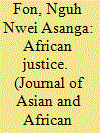

|
|
|
|
|
| Summary/Abstract |
In 2017, the African Union adopted a non-binding resolution calling for a collective withdrawal of its members from the International Criminal Court (ICC). An exodus from the ICC poses the question of what happens next in the African judicial landscape. This paper probes into efforts to erect an African judicial infrastructure. It is a non-experimental case study that employs the characteristics of international law to examine various attempts towards forging an African judicial system. A critical examination of existing African judicial institutions against certain benchmarks of international law reveals that alternative structures and mechanisms of international justice exist in Africa.
|
|
|
|
|
|
|
|
|
|
|
|
|
|
|
|
| 6 |
ID:
165763
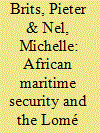

|
|
|
|
|
| Summary/Abstract |
Traditionally the African concept of security concept has been dominated by land-based conflicts with little attention being paid to maritime threats and the protection of the maritime environment. With the rapid escalation of piracy on the East Coast, the African Union (AU) was compelled to develop a joint strategy to address its changing African Maritime Domain (AMD). This was achieved by the AU’s Africa’s Integrated Maritime Strategy (AIMS 2050) in 2014, culminating in the adoption of a binding maritime security and safety charter in Lomé in 2016. The Lomé Charter should ideally focus the general provisions of AIMS 2050 so that Africa, as a continent, can take responsibility for security and economic empowerment of the AMD. This article considers various maritime security documents against the backdrop of an African context for understanding maritime security, in order to evaluate whether the Lomé Charter, as a manifestation of AIMS 2050, will realise its aspirations. Focussing on security is not sufficient and too much emphasis is placed in the Lomé Charter on restriction rather than development. Strong political will and leadership is required to facilitate implementation, identifying common security concerns to ensure better cooperative and collective strategies in a diverse implementation environment.
|
|
|
|
|
|
|
|
|
|
|
|
|
|
|
|
| 7 |
ID:
151972
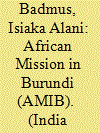

|
|
|
|
|
| Summary/Abstract |
This article examined the African Mission in Burundi (AMIB), assessed its success and drew lessons learned from the experience. The author argued that the mission was successful in restoring peace and stability in Burundi, although the disarmament, demobilisation and reintegration (DDR) component of its mission was not achieved. The willingness of the African Union (AU) to send a peacekeeping mission as a stabilizing force within an ongoing conflict shows that the organization is serious about tackling security issues on the continent. In spite of AU’s endeavours, the article establishes that the AU is being challenged by what is called the ‘triangular area of tension in African peacekeeping (AU’s ambitions versus AU’s peacekeeping capacities versus member states’ political will and agendas). The article concludes with a reflection on lessons learnt from AMIB as a prelude to addressing this area of tension for better future peacekeeping performances in Africa.
|
|
|
|
|
|
|
|
|
|
|
|
|
|
|
|
| 8 |
ID:
169364
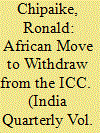

|
|
|
|
|
| Summary/Abstract |
Africa’s relationship with the International Criminal Court (ICC) has been strained over the past few years. Threats by a number of African states to withdraw from the ICC’s jurisdiction have marked a crescendo in the strained relationship. This study looks at the issues surrounding the proposed or threatened mass withdrawal by African countries and the implications for peace and justice in the African continent. Utilising interviews with a cross section of key informants including members of the African diplomatic community resident in Zimbabwe, this study highlights that it is difficult for African states to withdraw en masse since not all states are agreeable to this stance. The study further highlights that although the ICC is not a perfect institution, it is the only alternative court of last resort that can deal with human rights and international humanitarian law violations as well as impunity in the continent. The proposed African Court of Justice and Human Rights (ACJHR) has not yet taken root owing to a shortage of adequate ratifications of the protocol establishing it. Thus, although concerns of unfair targeting of African leaders and individuals by the ICC could be considered valid, African states need to find a way of establishing a cordial relationship with the ICC to ensure the protection of individual rights while they establish regional institutions to deal with cases currently being referred to the ICC.
|
|
|
|
|
|
|
|
|
|
|
|
|
|
|
|
| 9 |
ID:
064734
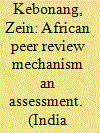

|
|
|
|
|
| Publication |
Apr-Jun 2005.
|
|
|
|
|
|
|
|
|
|
|
|
|
|
|
|
| 10 |
ID:
157728
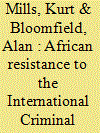

|
|
|
|
|
| Summary/Abstract |
The creation of the International Criminal Court (ICC) in 1998 marked a substantial advance in the effort to ensure all perpetrators of mass atrocities can be brought to justice. Yet significant resistance to the anti-impunity norm, and the ICC as the implementing institution, has arisen in Africa. The ICC has primarily operated in Africa, and since it sought to indict the sitting Sudanese President Omar al-Bashir in 2008 resistance from both individual African states and the African Union has increased substantially. We draw on the concept of ‘norm antipreneurs’, and the broader norm dynamics literature, to analyse how resistance has developed and manifested itself, as well as the potential effects of this resistance on the anti-impunity norm. We conclude that the antipreneur concept helped us structure and organise analysis of the case – suggesting it could be usefully deployed in other similar cases – but that this case also suggests that antipreneurs do not always enjoy substantial defensive advantages. We also conclude that African resistance to the ICC has substantially stalled the advance of the anti-impunity norm, a finding that has significant implications for the wider effort to reduce mass atrocity crimes in the contemporary era.
|
|
|
|
|
|
|
|
|
|
|
|
|
|
|
|
| 11 |
ID:
119450
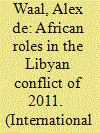

|
|
|
|
|
| Publication |
2013.
|
| Summary/Abstract |
Libya's relationship with sub-Saharan Africa has been complex, troubled and misunderstood, both during the rule of the late Libyan leader Muammar Gaddafi and the conflict that culminated in his overthrow and death. The Libyan conflict of 2011 divided Africa, but nonetheless the African Union (AU) was able to agree on a political strategy aimed at achieving a negotiated settlement and power transition.
The AU's peace initiative was launched in March 2011 and, contrary to widespread perception that the AU sought to prop up Gaddafi, it offered a credible and balanced option of a negotiated solution. United Nations Security Council resolution 1973 expressed support for the initiative, but in the event France, Britain and the United States blocked its chances of success.
This article draws on evidence and analysis provided by the AU officials involved. It details the process whereby the AU adopted and implemented its decisions, and describes the AU's diplomatic engagement with Gaddafi and the National Transitional Council. The article also draws on information provided by Sudanese military and intelligence officials, providing an account, hitherto untold, of how the Sudanese government supported the Libyan opposition with military supplies, training and intelligence, in tacit cooperation with NATO countries.
The article concludes with reflections on how the Libyan conflict has had an impact on the doctrine of the 'responsibility to protect', on the AU, and on Libya's relations with Africa.
|
|
|
|
|
|
|
|
|
|
|
|
|
|
|
|
| 12 |
ID:
156092
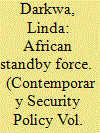

|
|
|
|
|
| Summary/Abstract |
Declared operationally ready in 2016, the African Standby Force (ASF) has not been deployed in its originally designed form. This is not for the lack of opportunities but rather a demonstration of the power of the Regional Economic Communities/Regional Mechanisms (RECs/RMs) – Africa’s sub-regional security structures – over matters of peace and security. Experience gathered from its short existence suggests that the ASF may never be deployed in its current form. It may instead evolve into a robust framework, adaptable mainly by the RECs/RMs, for addressing varied security challenges. Four things are critical to enhancing the utility of the ASF: the political willingness of the RECs/RMs, the strategic interest of the member states, predictable and sustainable financing, and clarity on the role of the African Capability for Immediate Response to Crisis, the temporary battlegroup that was created to provide the African Union with a rapid response capability, pending the ASF’s operationalization.
|
|
|
|
|
|
|
|
|
|
|
|
|
|
|
|
| 13 |
ID:
058366
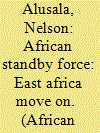

|
|
|
| 14 |
ID:
057187
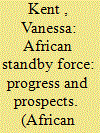

|
|
|
| 15 |
ID:
067661
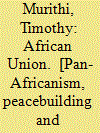

|
|
|
|
|
| Publication |
Aldershot, Ashgate, 2005.
|
| Description |
viii, 174p.
|
| Standard Number |
0754639533
|
|
|
|
|
|
|
|
|
|
|
|
Copies: C:1/I:0,R:0,Q:0
Circulation
| Accession# | Call# | Current Location | Status | Policy | Location |
| 050667 | 341.249/MUR 050667 | Main | On Shelf | General | |
|
|
|
|
| 16 |
ID:
081032
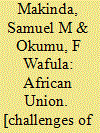

|
|
|
|
|
| Publication |
London, Routledge, 2008.
|
| Description |
xvii, 209p.
|
| Series |
Routledge global institutions
|
| Standard Number |
9780415403498
|
|
|
|
|
|
|
|
|
|
|
|
Copies: C:1/I:0,R:0,Q:0
Circulation
| Accession# | Call# | Current Location | Status | Policy | Location |
| 053134 | 341.249/MAK 053134 | Main | On Shelf | General | |
|
|
|
|
| 17 |
ID:
083898
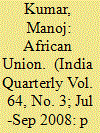

|
|
|
| 18 |
ID:
087423
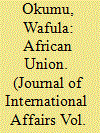

|
|
|
|
|
| Publication |
2009.
|
| Summary/Abstract |
As the African Union (AU) moves toward its tenth anniversary in 2012, it is drawing a great deal of attention to its handling of mounting crises that test its commitment. Across the continent, the AU is faced with crises that test its commitment and capability to fulfill the ambitious agenda it adopted at its formation in 2002.
|
|
|
|
|
|
|
|
|
|
|
|
|
|
|
|
| 19 |
ID:
131222
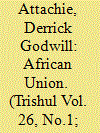

|
|
|
| 20 |
ID:
162482
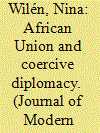

|
|
|
|
|
| Summary/Abstract |
In December 2015, the African Union (AU) took the unprecedented step of threatening to use military force against the government of Burundi's wishes in order to protect civilians caught up in the country's intensifying domestic crisis. This article traces the background to this decision and analyses the effectiveness and credibility of the AU's use of coercive diplomacy as a tool of conflict management. After its usual range of conflict management tools failed to stem the Burundian crisis, the AU Commission and Peace and Security Council tried a new type of military compellence by invoking Article 4(h) of the Union's Constitutive Act. We argue that the threatened intervention never materialised because of (1) the Burundian government's astute diplomacy and (2) several African autocrats’ resistance to setting a precedent for future interventions where concerns about civilian protection might override state sovereignty.
|
|
|
|
|
|
|
|
|
|
|
|
|
|
|
|
|
|
|
|
|